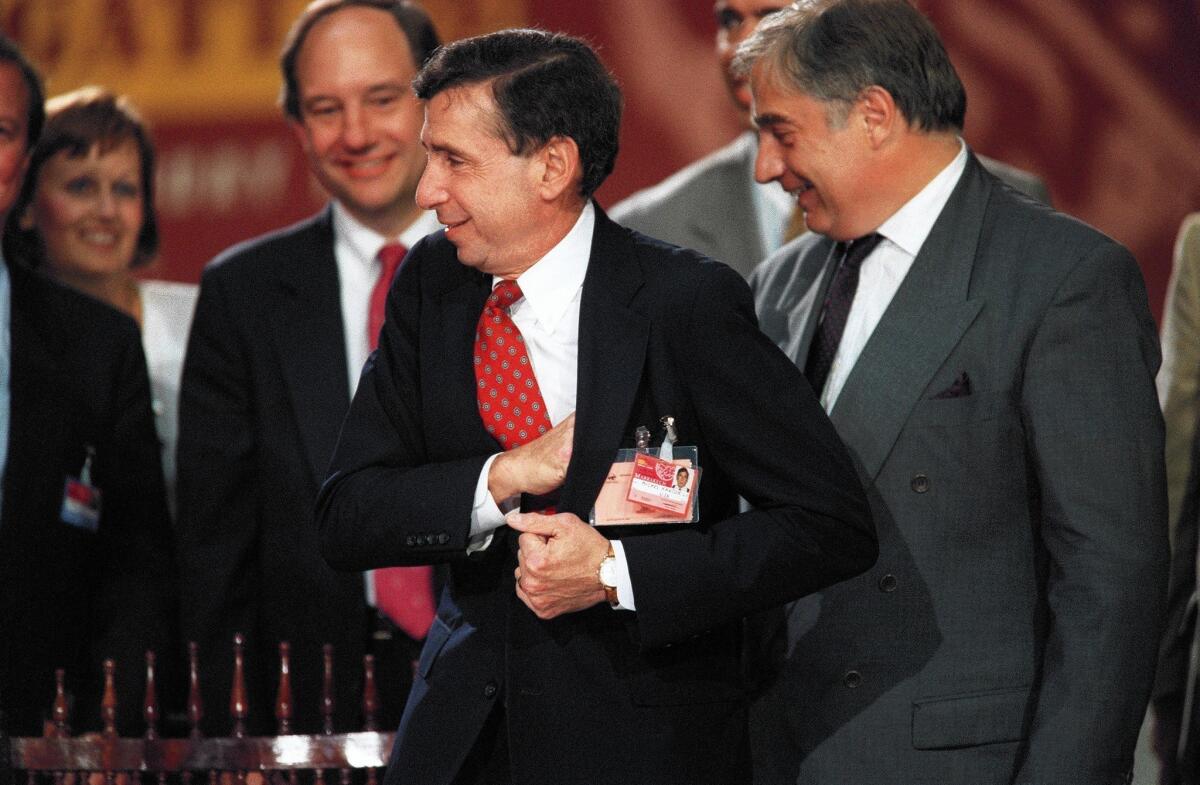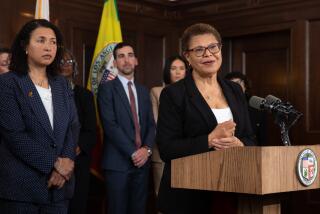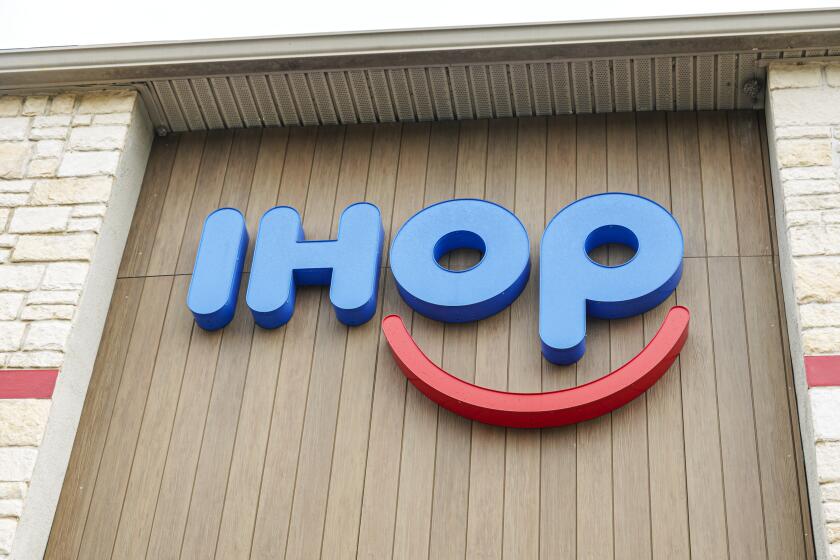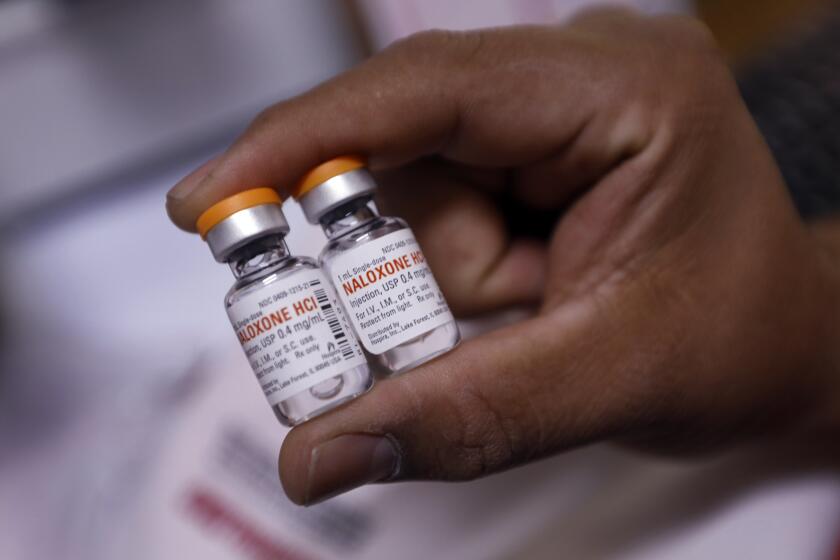L.A. is facing a grim tomorrow, panel says

Los Angeles is a city facing economic decline, weighed down by poverty, strangled by traffic and suffering from a crisis of leadership, according to a report released Wednesday by a 13-member panel of influential civic leaders.
The Los Angeles 2020 Commission offered a harsh assessment of government decision-making, warning that the nation’s second-largest city is heading to a future where it can no longer afford to provide public services. Among a litany of problems highlighted in the report are underfunded retirement programs for City Hall employees, slower police and fire response times, and government spending that is growing faster than revenue.
The panel, led by former U.S. Commerce Secretary Mickey Kantor, said the city lacks a coherent approach to economic development and trails other major cities in job growth. “The city where the future once came to happen has been living in the past and leaving tomorrow to sort itself out,” the report states.
The report, titled “A Time for Truth,” was commissioned last year by City Council President Herb Wesson. It arrives as the city is struggling to regain its
financial footing after a turbulent five-year period of
recurring budget crises, the elimination of 5,300 jobs and battles to secure union concessions on pensions and retirement benefits.
The panel’s findings are based on a variety of previously published reports. Commission members said the report’s value is in its candor and distillation of a wide array of regional problems by a cross-section of business, labor and nonprofit group leaders, including former Gov. Gray Davis; former Secretary of Labor Hilda Solis, now a candidate for Los Angeles County supervisor; and Brian D’Arcy, head of the city utility’s biggest union.
Among the challenges highlighted by the panel: a poverty rate higher than many other American cities; city revenue that has remained flat since 2009; a shrinking middle class; and “wishful” responses to a “continued economic decline.”
The commission now embarks on a second, more politically treacherous task: getting disparate members with potentially divergent interests to develop a plan to address the problems they have identified. Kantor said those recommendations would be ready within 90 days.
Those topics will almost certainly include the city’s budget, including efforts to cope with rising public employee pensions, among the most politically sensitive issues for elected officials in California.
“It’s good to impanel a commission that’s broad and diverse to look at what most ails the city,” said Jaime Regalado, professor emeritus of political science at Cal State L.A. “The danger is always, as with many past studies, they’re largely going to be ignored if the political or financial cost is too high,” he said.
Wesson, who asked Kantor to assemble the panel nearly a year ago, brushed aside the notion that the report reflects badly on the city’s lawmakers.
“I don’t view this as a criticism of me or the council. I view it as a challenge,” he said. “If people objectively view what has happened on the council the last few years, you will see that we don’t duck issues and we try to take on difficult issues.”
Kantor said blame for the “leadership crisis” should not fall on any specific elected official.
“It’s not just about one person or two people or a leader. It’s just not. It’s about everyone,” he said.
Mayor Eric Garcetti, a longtime elected official who became mayor part way through the group’s deliberations, said the commission’s report will strengthen his “reform” agenda. “I’m pleased to see a report that diagnoses many of the things that I’ve been talking about,” he said.
Initially, the 2020 panel had a narrower charge: finding ways to expand Los Angeles’ economy and restore financial stability to City Hall. But the group went further, staking out positions on traffic congestion, poverty and the state of public schools.
The report warns that the Los Angeles Unified School District is “failing our children and betraying the hopes of their hardworking parents.” It said projects promised under Measure R, a 2008 sales tax hike for public transit, would yield little improvement in some of the nation’s worst traffic congestion. And it asserted that the city’s push to have 10,000 police officers — a benchmark achieved by former Mayor Antonio Villaraigosa — was “not real” because of how the officers have been deployed in recent years.
A key contributor to the report was Austin Beutner, who worked for Villaraigosa before launching, and then quickly abandoning, a bid for mayor. In appearances throughout the day, Beutner highlighted the financial problems confronting the city, from “unsustainable” public employee pension costs to lack of money to trim trees and hire operators to staff a City Hall help line.
“By almost any measure, city services are in decline,” he told The Times.
Beutner served more than a year as Villaraigosa’s “jobs czar.” Other commission members have done business at City Hall — and had interests that made their way into the 2020 report.
Part of the report criticizes city leaders for taking eight years to approve a rail yard backed by Burlington Northern Santa Fe Railway — a company that was represented by Kantor, a corporate lawyer. “Competitive ports have all made major improvements, while Los Angeles bent to the will of special interest groups and NIMBYism,” said the report, a reference to so-called “not in my backyard” opponents of new development projects.
Another passage hit city leaders for taking three years to approve a $1-billion development plan sought by USC. “Not a sensible way to treat the city’s largest private employer,” the report states. Thomas Sayles, USC’s senior vice president, is among the panel’s members.
The commission held eight sessions with civic experts between April and June, hearing from former Assembly Speaker Bob Hertzberg — a lawyer at Kantor’s firm — as well as city budget analysts, labor leaders and representatives of neighborhood councils. Although some of the report’s sharpest criticism was aimed at Los Angeles Unified, the commission did not have school district representatives appear at its meetings.
Supt. John Deasy called that fact “a little unfortunate.” And he questioned the report’s “sweeping generalized statements,” saying that a national assessment system showed L.A. Unified improving faster than other large, urban school systems in key categories. Other data, he said, show that both dropout rates and suspensions are decreasing.
“We have always lots of places to improve, no question about it,” he said. “However, I patently disagree with the statement that we are failing all of our kids.”
Kantor said Deasy is “doing as good a job as you can do.” He signaled that the commission would probably not offer any recommendations on public schools.
“I’m not sure I’m qualified or anyone is qualified on this commission to really get into that,” he said.
catherine.saillant@latimes.com
More to Read
Start your day right
Sign up for Essential California for news, features and recommendations from the L.A. Times and beyond in your inbox six days a week.
You may occasionally receive promotional content from the Los Angeles Times.









